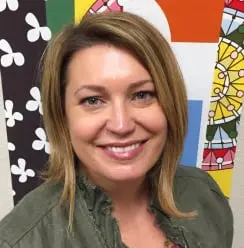 | 1.5 LU |
 | 1.5 LU |
The American Psychological Association (APA) reports 81% of Gen Z teens (ages 13-17) have experienced more intense stress during the COVID-19 pandemic. This does not include the students already suffering from elevated stress like refugee status or homelessness. How are schools now coping with the increased number of students with increased stress and the widening range of student needs? Throughout this talk, our expert panelists will provide research in psychology, counseling, and design to explain the fundamentals of why wellness in the educational environment is even more critical in a post covid world. In addition to research, educators and designers will offer real-life transferable tips and tactics for evoking support and re-engaging the Whole Student.
Learning Objectives:

As a Senior Associate at Lionakis, Jennifer brings over 14 years of specialized educational facility planning, design and construction administration experience. Jennifer utilizes her knowledge and skills as a competent architect to successfully lead project teams from conceptual design through closeout. She maintains consistent communication with all project team members and keeps the project well organized. She excels at engaging clients and building lasting relationships that consistently lead to repeat clients and additional projects.

Victoria is in her 25th year of serving children, families, and our community, including the past 8 years serving and supporting the physical and emotional health services within SCUSD district leadership. She supervises school-based physical, mental health and social supports provided through school-based Student Support Centers and the centrally located Connect Center, Foster Youth Services, Homeless Services and Health Services. She is a graduate of the Sacramento City Unified School District and holds a Master of Social Work degree from UC Berkeley, as well as a School Social Work Credential and Administrative Credential.

Anna is a Licensed Marriage and Family Therapist currently working with the Student Health Clinic at University of California, Santa Cruz where she provides behavioral health consultation and supports efforts towards integrated health care. Additional areas of interest and expertise include anxiety, developmental trauma, PTSD, addressing addiction and other unsafe behaviors, grief and loss, co- dependency, relationship skills and working with individuals who have chronic medical conditions to improve their overall functioning.
This track focuses on Resiliency and addresses how learning environments support the development of students and communities that have the strength and flexibility to withstand adversity and adapt to change. The COVID-19 pandemic demonstrated the essential role that schools have in stabilizing communities during a time of crisis. How do schools support the development of strong community culture among teachers and students? How do schools foster physical and mental health and wellness to ensure all are ready and supported to learn? How do we create learning environments that are strong in intent yet adaptable to change? How do we learn from what does not work and further, learn to take risks daily to expand our comfort zone? What can we learn from research and our responses to past events to inform how to build toward a resilient future where we can withstand what crises and challenges the future brings? Topic areas, seen through the lenses of both Art and Science, include sustainability, physical and mental health, community, school climate and culture, safety, and security.
Primary Core Competency
Design of Educational Facilities: Acts as a resource to the design team in providing ongoing guidance and support to ensure that the emerging and ultimate design aligns with the established community vision, education goals, future programming, written design standards, best/next practices and education policy.